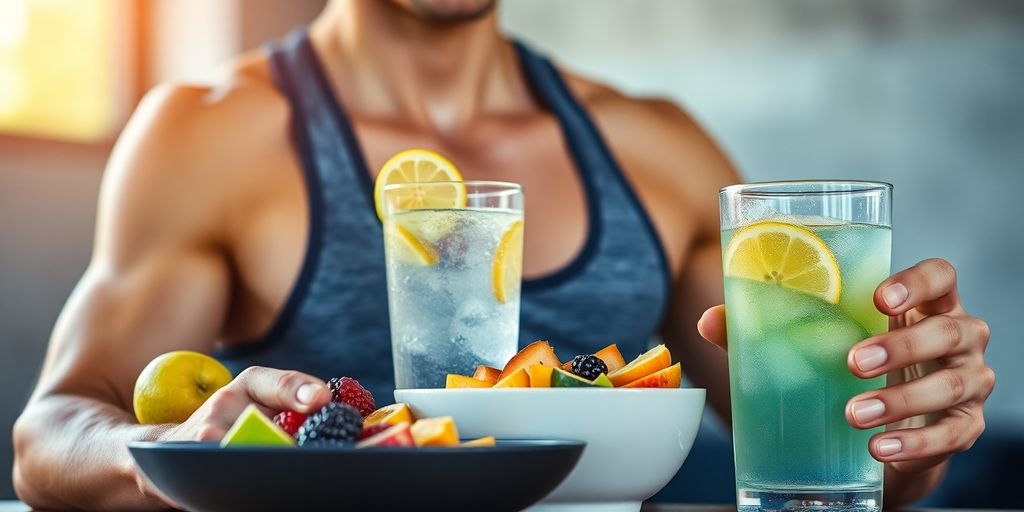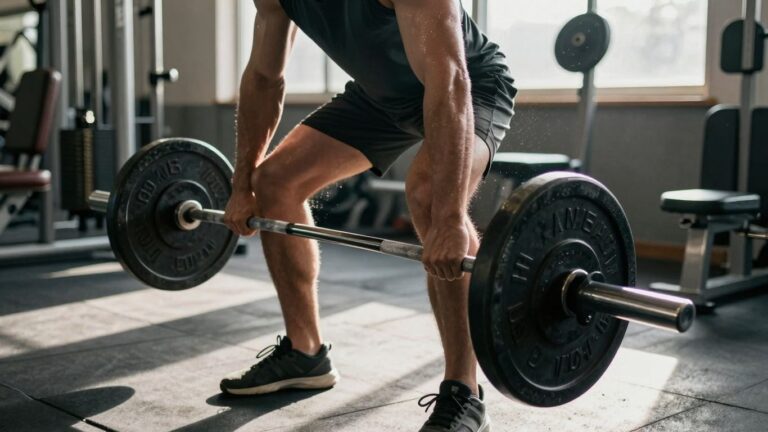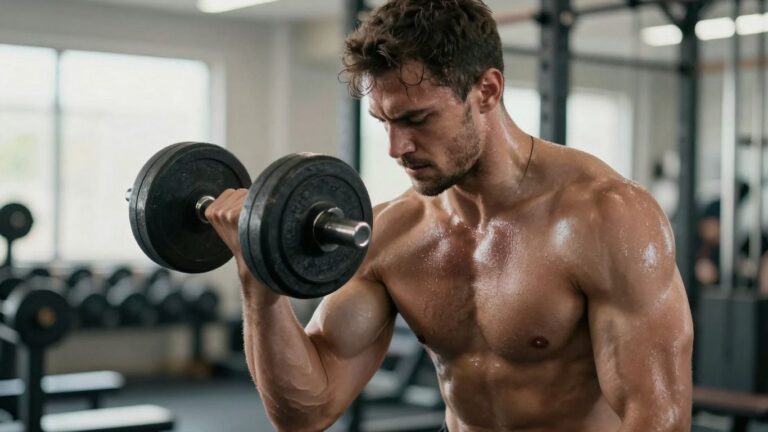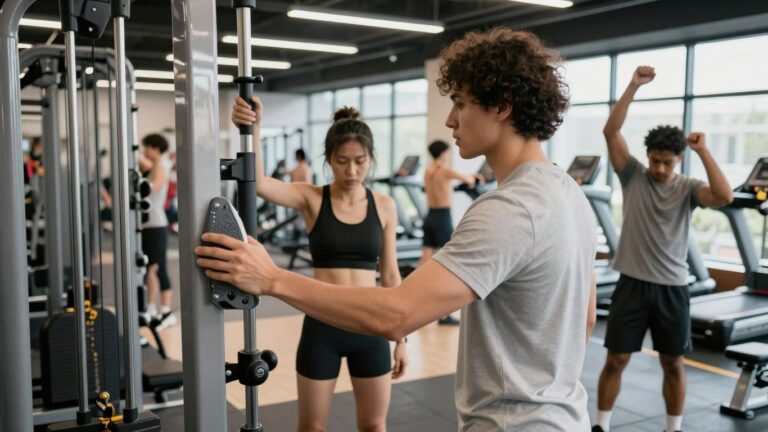Getting your body ready for a workout, and then helping it recover afterwards, is pretty important. It’s not just about showing up and doing the moves; what you eat and drink plays a big role in how well you perform and how quickly you bounce back. Think of food as the fuel for your personal engine – you wouldn’t drive a car on empty, right? This guide will walk you through the basics of fueling up before, during, and after your exercise sessions, making sure you get the most out of every sweat session.
Key Takeaways
- Eating carbohydrates before your workout is key for energy, especially for longer or more intense sessions. Think fruits, whole grains, or yogurt.
- Timing matters: eat a larger meal 3-4 hours before, or a smaller, easily digestible carb snack 30-60 minutes prior.
- Staying hydrated is just as important as food; sip water regularly before, during, and after exercise.
- After your workout, focus on replenishing energy stores with carbs and aiding muscle repair with protein.
- For weight loss, consider exercising on an empty stomach or timing light snacks carefully to maximize fat burning, but listen to your body.
Fueling Up Before Your Workout
Getting ready for a workout isn’t just about showing up; it’s also about making sure your body has the energy it needs to perform its best. Think of it like getting your car ready for a long drive – you wouldn’t start with an empty tank, right? Your body is similar. Proper fueling before you exercise can make a big difference in how you feel and how much you can accomplish. It’s not about eating a huge meal right before you sweat, but rather making smart choices that give you sustained energy without weighing you down.
The Importance of Pre-Workout Nutrition
Fueling up beforehand is all about giving your muscles the energy they need to work efficiently. When you eat the right things, you’re essentially topping off your energy stores, which are primarily made up of carbohydrates. This helps you maintain intensity throughout your session and can even help preserve muscle. Skipping this step is like trying to run on fumes – you might get going, but you won’t get far, and you’ll likely feel pretty drained.
What to Eat Before Workout: Carbohydrate Focus
When it comes to pre-workout fuel, carbohydrates are your best friend. They’re the body’s preferred energy source, especially for your muscles. Aim for complex carbohydrates that digest more slowly, providing a steady release of energy. Think whole grains, fruits, and vegetables. While protein is important for overall health and muscle repair, it digests slower and can take energy away from your muscles if eaten too close to your workout. Fats should also be kept low before exercise for the same reason.
Here’s a quick look at good carb sources:
- Whole-grain bread or toast
- Oatmeal or whole-grain cereals
- Fruits like bananas, apples, or berries
- Sweet potatoes
- Brown rice
Timing Your Pre-Workout Meal or Snack
Timing is pretty key here. If you’re eating a full meal, try to have it about three to four hours before you plan to exercise. This gives your body plenty of time to digest. If your workout is closer, say one to three hours away, a smaller meal or a snack is a better bet. For those super early morning workouts or when you’re really pressed for time, a small, easily digestible carbohydrate snack about 30-60 minutes before you start can be a lifesaver. This helps prevent that sluggish feeling and keeps you going strong. You can find some great ideas for quick snacks at Clayton Fitness NC.
Eating too much right before exercise can make you feel heavy and slow. On the flip side, not eating enough might leave you without the energy to push yourself. It’s all about finding that sweet spot that works for your body and your workout schedule.
Smart Snacking for Energy
Sometimes you just need a little something to keep you going between meals, especially if you’ve got a workout planned. Smart snacking is all about giving your body the right kind of fuel at the right time. It’s not just about grabbing whatever’s handy; it’s about making sure you have enough energy to perform well and feel good doing it.
Quick Bites for a Last-Minute Boost
If your workout is coming up soon, like within an hour, you want something that’s easy to digest and mostly carbs. Think simple sugars that your body can use quickly. This isn’t the time for a big, heavy meal. A small, carb-focused snack can prevent you from feeling sluggish or hungry during your exercise session. It’s like putting a little bit of gas in the tank right before a drive.
Combining Carbs and Protein for Sustained Energy
Now, if you have a bit more time before you hit the gym or the trail, say an hour or two, you can get a little more strategic. Combining carbohydrates with a bit of protein can give you more sustained energy. The carbs provide the immediate fuel, while the protein starts to work on muscle support. This combo helps keep your energy levels more stable throughout your workout. It’s a good way to avoid that mid-workout slump.
Hydration is Key Before You Start
Don’t forget about fluids! Being properly hydrated is just as important as having the right snacks. Even mild dehydration can really mess with your performance and how you feel. Aim to drink some water a good while before you start exercising. This helps your body function smoothly and keeps everything working as it should. Think of it as preparing your body’s internal systems for the work ahead.
During Your Workout: Staying Fueled
Think of your workout like a car – you need to keep the engine running smoothly, and that means fueling up properly, even while you’re in motion. It’s not just about pushing through; it’s about making sure your body has what it needs to perform at its best and recover well.
When to Consider Mid-Workout Fueling
For workouts that go beyond an hour, or if you’re doing something stop-and-go like playing basketball or tennis, topping off your fuel tank mid-session can make a big difference. It helps you keep going strong and maintain focus. If it’s been a while since your last meal, this is especially helpful.
Carbohydrate Needs for Longer Sessions
When you’re exercising for an extended period, your body burns through carbohydrates, which are your muscles’ primary fuel source. For sessions lasting over 60 to 90 minutes, aiming for about 30 to 90 grams of carbohydrates per hour can help keep your energy levels up. Think of things like a banana, some raisins, or a sports gel. For shorter, less intense workouts, you might not need anything during the session itself, but staying hydrated is always important.
Staying Hydrated During Exercise
Keeping up with fluids is just as important as food. Small, regular sips of water throughout your workout are key. If you’re sweating a lot or the weather is warm, you might also want to consider drinks that replace electrolytes, but be mindful of added sugars. Sometimes, just adding a bit of fruit to your water can give it a nice flavor and a little extra something.
Refueling Your Body Post-Workout
So, you’ve crushed your workout – awesome! Now it’s time to give your body the good stuff it needs to bounce back. Think of it like putting gas in your car after a long drive; your muscles have used up a lot of energy, and they need to be refueled to repair and get stronger.
The Recovery Window: What to Eat Immediately After
There’s a sweet spot, often called the ‘recovery window,’ which is generally the first hour or so after you finish exercising. This is when your body is really good at taking in nutrients to start the repair process. Getting some carbs and protein in during this time can make a big difference. It helps kickstart the rebuilding of muscle tissue and gets your energy stores back up.
Replenishing Glycogen Stores
During your workout, your muscles used up their stored carbohydrates, called glycogen. Eating carbohydrates after exercise is key to refilling these stores. Your muscles are like sponges right after a workout, ready to soak up those carbs. Aim for easily digestible sources to get them in quickly.
Protein for Muscle Repair and Growth
Protein is the building block for your muscles. After a tough session, your muscles have tiny tears that need protein to fix themselves and grow back even stronger. Including a good protein source in your post-workout meal or snack helps this process along nicely. It’s all about giving your body the materials it needs to get the job done.
Here’s a quick look at what to aim for:
- Carbohydrates: To refill energy stores.
- Protein: To repair and build muscle.
- Fluids: To rehydrate after sweating.
Don’t forget that staying hydrated is just as important as eating. You lose fluids through sweat, so sipping on water or an electrolyte drink after your workout helps your body recover and get back to normal. Proper hydration is key for optimal workout performance. Sip water or electrolyte drinks before, during, and after exercise to prevent dehydration, which can lead to headaches and sluggishness.
Think about having something like a banana with peanut butter, Greek yogurt with berries, or even a small turkey sandwich. These options provide a good mix of what your body needs to start recovering effectively.
Post-Workout Meals for Optimal Recovery
So, you’ve crushed your workout – awesome! Now comes the part that’s just as important: refueling your body so it can bounce back and get stronger. Think of this as the ‘thank you’ you give your muscles for all their hard work. Getting the right mix of nutrients after you exercise is key to helping your muscles repair and grow, and it also tops up your energy stores so you’re not dragging later.
Balancing Carbs and Protein in Your Recovery Meal
After a tough session, your body is basically crying out for two things: carbohydrates and protein. Carbs are like the quick-fix fuel that helps replenish the glycogen stores you just used up. Protein, on the other hand, is the building block for muscle repair and growth. The sweet spot is usually a ratio of about 3:1 or 4:1 carbs to protein. This combo helps kickstart the recovery process efficiently. For example, a smoothie with fruit and Greek yogurt, or chicken breast with a side of sweet potato, are great ways to hit this balance. It’s not just about what you eat, but also about getting it in relatively soon after you finish. Aiming for this within an hour or so after your workout is ideal, but don’t stress if life gets in the way; within a couple of hours is still very beneficial. Remember, consistent good nutrition throughout the day also plays a big role in your overall recovery, not just the post-workout meal. You can find some good ideas for post-workout meals here.
Hydration After Exercise
Don’t forget about fluids! You lose water and electrolytes through sweat, so rehydrating is super important. Water is your best friend, but if you’ve had a really long or intense workout, you might also want to consider drinks that replace electrolytes. A good rule of thumb is to drink about 16 to 24 ounces of fluid for every pound of body weight you lost during your workout. Weighing yourself before and after can give you a good idea of how much you sweated out. Even if you don’t weigh yourself, just make sure you’re sipping on fluids consistently after you exercise until your urine is a pale yellow color. Eating fruits and vegetables that have a high water content can also help with hydration.
Timing Your Post-Workout Nutrition
When you eat after your workout can make a difference, especially if you’re training again soon or have another intense activity planned. The period right after exercise, often called the ‘recovery window,’ is when your body is most receptive to nutrients. Eating a snack or meal containing both carbohydrates and protein within 15 to 60 minutes after finishing can really help speed up muscle repair and glycogen replenishment. If you can’t get a full meal in right away, a protein shake or a piece of fruit with some nuts can be a good stand-in. For most people, having a balanced meal within two to three hours after exercise is perfectly fine and still supports recovery. It’s all about listening to your body and fitting nutrition into your schedule in a way that works for you.
Nutrition for Weight Management and Exercise
When you’re focused on shedding pounds and getting fitter, what and when you eat around your workouts can really make a difference. It’s all about finding that sweet spot where you’re fueling your body enough to perform well but not so much that you’re undoing your calorie goals.
Exercising on an Empty Stomach: Pros and Cons
Working out first thing in the morning before you’ve eaten anything can be a strategy some people use for weight loss. The idea is that your body might tap into fat stores for energy since your glycogen levels are lower. Some studies suggest this might lead to slightly more fat burning during the workout itself. However, it’s not a magic bullet. If you’re not fueled, you might find your workout intensity suffers, meaning you burn fewer calories overall. Plus, you could feel sluggish or even lightheaded, which isn’t ideal for safety or performance. It really depends on the individual and the type of exercise.
Timing Meals to Support Fat Burning
For weight management, the timing of your meals relative to your exercise can be strategic. Eating a balanced meal about 3-4 hours before a workout is great for longer sessions. If your workout is closer, a smaller, carb-focused snack 1-2 hours beforehand is better. Think half a banana or a small cup of applesauce. This gives you energy without feeling heavy. The key is to have enough fuel to push yourself, but avoid overeating. Proper nutrition coaching can help you map this out. Personalized nutrition plans are designed to align your eating with your activity.
When a Post-Workout Meal Isn’t Necessary
If your workouts are generally low to moderate intensity, like a brisk walk or a light jog for less than an hour, you might not need a specific post-workout meal. Instead, focus on eating regular, balanced meals every 4-5 hours throughout the day. This approach helps manage hunger and keeps your metabolism humming. However, if you’ve done something more intense, like weightlifting, high-intensity interval training, or any exercise lasting over an hour, then refueling with a mix of protein and carbs within an hour after you finish is pretty important. This helps your muscles recover and rebuild, and prevents you from feeling overly hungry later on, which can lead to overeating. It’s a balancing act, for sure.
Eating right is super important when you’re trying to manage your weight and get fit. What you eat fuels your body for workouts and helps it recover. Making smart food choices can really make a difference in reaching your fitness goals. Want to learn more about how to eat for success? Check out our website for tips and guidance!
Keep It Simple and Consistent
So, that’s the lowdown on fueling your body before and after you hit the gym or go for that run. It’s not rocket science, really. Just think of your body like a car – it needs the right kind of gas to run well, and you need to refuel it afterward so it can repair itself. You don’t need to stress about fancy diets or complicated meal plans. Focus on eating real food, staying hydrated, and listening to what your body tells you. Consistency is key, and over time, you’ll figure out what works best for you and your personal fitness journey. Happy training!
Frequently Asked Questions
Why is eating before a workout so important?
Think of your body like a car. You need to put gas in it to make it go! Eating the right foods before exercising gives you the energy to perform well and helps your body burn calories more effectively. Without fuel, you might feel tired and won’t get as much out of your workout.
What kind of food should I eat before exercising, and when?
About 2 to 3 hours before, you should eat a balanced meal that’s mostly carbs with some protein and not much fat. This helps your muscles get energy. If you only have about 30 minutes to an hour before, grab a quick, easy-to-digest carb like a banana or a small handful of crackers.
Do I need to eat while I’m working out?
For workouts lasting an hour or less, you probably don’t need to eat anything during. But if you’re exercising for a long time (over an hour) or doing something really intense, it’s a good idea to have some carbs. Think of things like a banana, some dried fruit, or a sports drink to keep your energy up.
Is it important to eat after a workout?
Yes, definitely! After you exercise, your body needs to refuel and repair itself. Eating a mix of carbs and protein within an hour or so helps your muscles recover and get ready for your next activity. It’s like giving your body the building blocks it needs.
What are good food choices for after my workout?
For recovery, aim for a meal or snack that has both carbs and protein. Carbs help restock the energy your muscles used, and protein helps them rebuild. Good examples include yogurt with fruit, a turkey sandwich on whole wheat bread, or even a protein shake.
Do I always need to eat after exercising if I want to lose weight?
If you’re trying to lose weight and doing lighter workouts (like walking or jogging for less than an hour), you might not need a special post-workout meal. Eating regular, healthy meals throughout the day is usually enough. However, after intense workouts, eating something with protein and carbs is still a good idea for muscle recovery.




